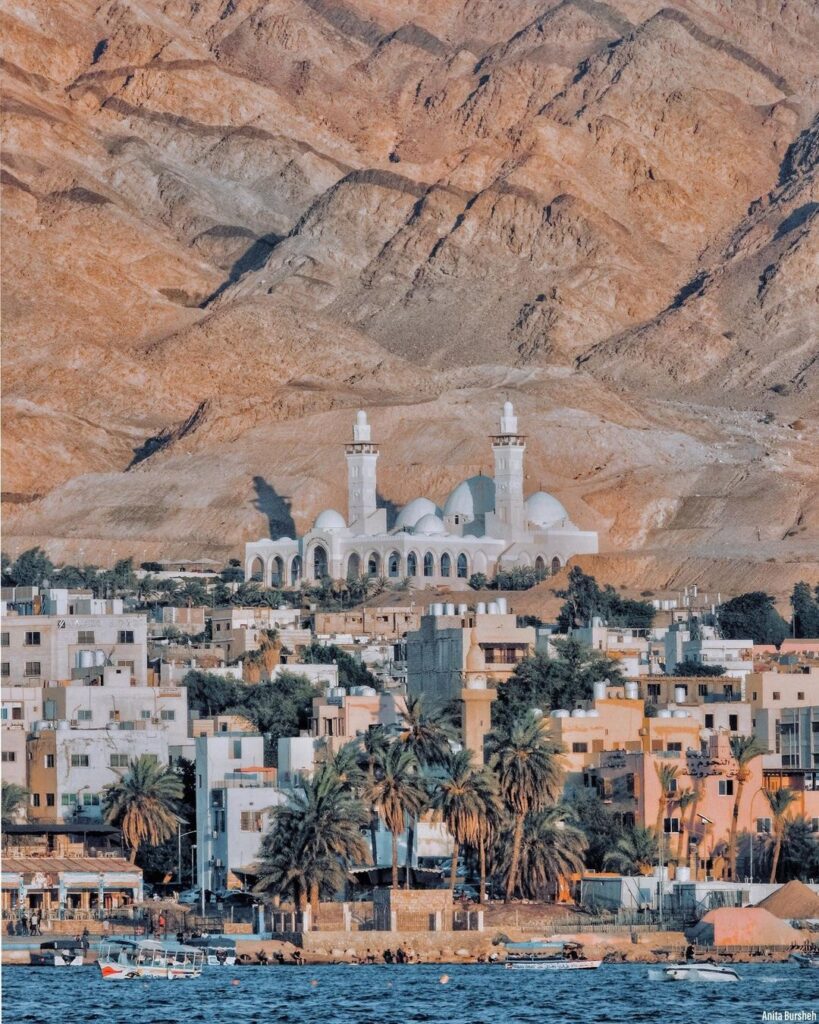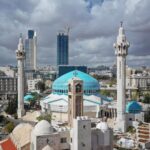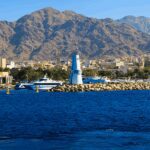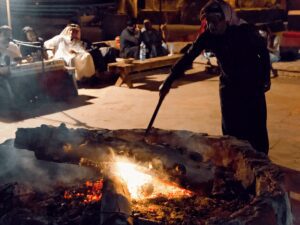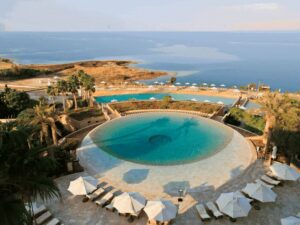Legend whispers of a time when King Solomon, seeking the comfort of sea breezes, visited the shores of Aqaba. Today, this southernmost city of Jordan is renowned as a hub of serenity and a nexus for regional commerce, where history’s fabric is woven deeply within modernity’s grasp.
Aqaba beckons the world.
Graced by year-round sunshine and embraced by the Red Sea’s crystal waters, Aqaba is a sanctuary for beachgoers and underwater adventurers alike. Here, cultural heritage meets luxury resorts, promising an experience as rich as the local corals.
Aqaba Historical Tapestry

Aqaba, Jordan’s only coastal city, stands as a living museum of human civilization, bearing undeniable evidence of cross-cultural interactions across millennia. Ancestral threads of the Nabataeans, a nomadic Arab people who excelled in trade and water engineering, blend seamlessly with influences from the ancient Egyptians, Romans, and the armies of Islam. Over centuries, Aqaba has been a strategic asset, coveted and conquered, leaving a legacy inscribed not only in texts but also in the resilient stones of Ayla, the early Islamic city, and the formidable Aqaba Fortress. This diverse historical heritage continues to resonate through Aqaba’s architecture, local customs, and the archaeological treasures awaiting discovery.
Ancient Past Unearthed
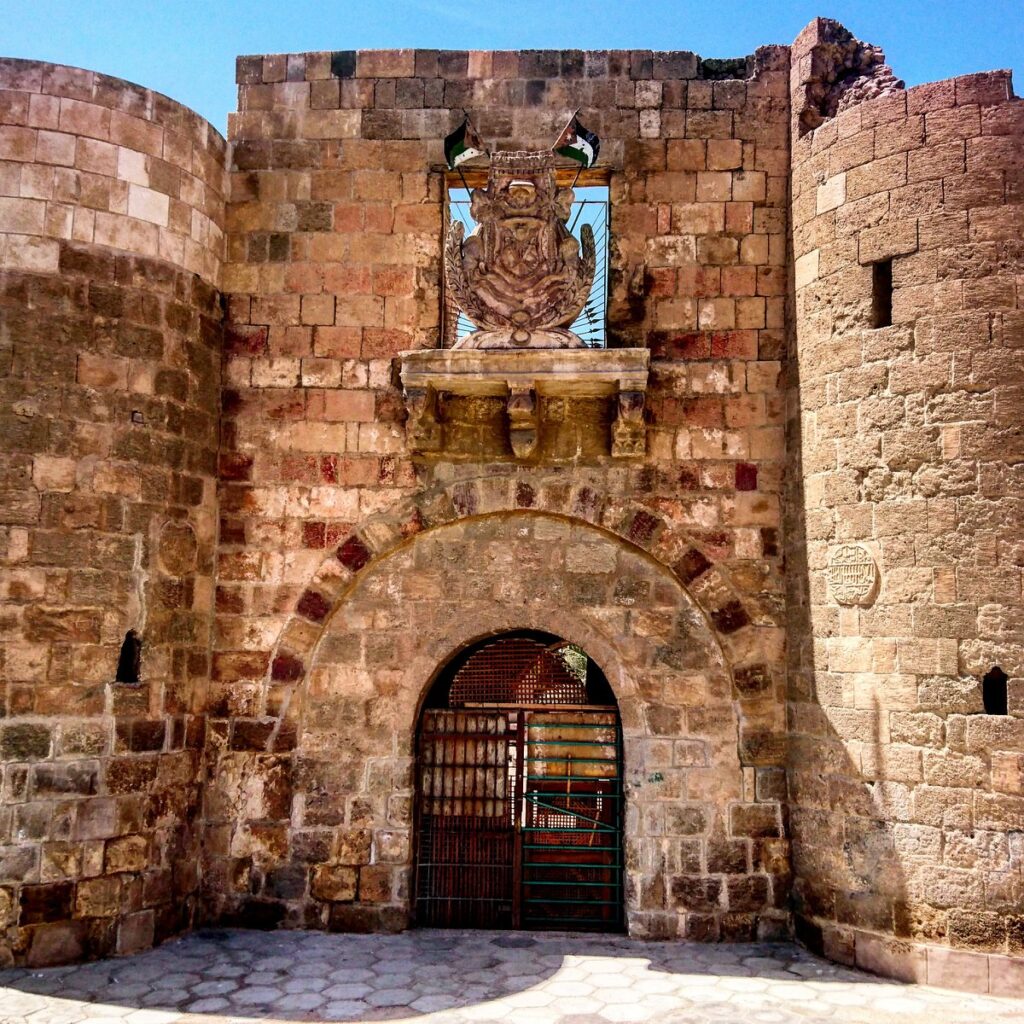
Aqaba’s heritage is underpinned by relics, a testament to a millennia-old nexus of civilizations, showcasing a historical mosaic rich in cultural synthesis. Enigmatic ruins beckon, offering glimpses into a storied antiquity that continues to captivate.
Excavations in Aqaba have unearthed vestiges of bygone empires, revealing a chronicle carved into the city’s landscape. A labyrinth of historical epochs, Aqaba’s soil conceals remnants of strategic significance, from the Nabataeans to the era of Islamic conquests.
Aqaba holds the oldest known purpose-built church in the world.
Each artifact and structure discovered contributes to the intricate narrative of Aqaba’s past, weaving together a complex tapestry. Insights glean from these finds enrich our understanding of ancient societies (not to mention contemporary ones), bridging the gap between the historical zeniths and nadirs that have shaped Aqaba’s identity.
Strategic Crossroads
Aqaba has long been lauded as a pivotal junction, bridging the East and West throughout history. Its geographical location has afforded it a significant role in trade, military, and cultural exchanges across eras.
Perched at the confluence of continents and oceans, Aqaba became a cornerstone of ancient trade routes, efficiently connecting the Arabian Peninsula with the Mediterranean world. As a harbor city, it was the nexus for the flow of goods, ideas, and peoples, a strategic entrepôt that shaped regional dynamics and helped forge ancient globalization. With the establishment of the Incense Route, Aqaba’s significance as a strategic crossroads was underscored, becoming an economic lifeline between civilizations.
Furthermore, Aqaba’s strategic importance transcended commercial interests; it was also a vital military waypoint. Conquerors and defenders recognized its value, often anchoring their regional domination strategies around controlling Aqaba. The city has witnessed a succession of rulers and empires, each leaving their imprint and contributing to its multifaceted historical character.
In contemporary times, Aqaba continues to leverage its strategic positioning within the global framework. Its status as Jordan’s only seaport confers a crucial role in the economic development of the region, serving as a gateway for trade and tourism alike. This sustained relevance underlines Aqaba’s historical and ongoing significance as a crossroads of civilizational exchanges, reinforcing its legacy as a linchpin of connectivity and diplomacy in the modern era.
Breathtaking Natural Wonders
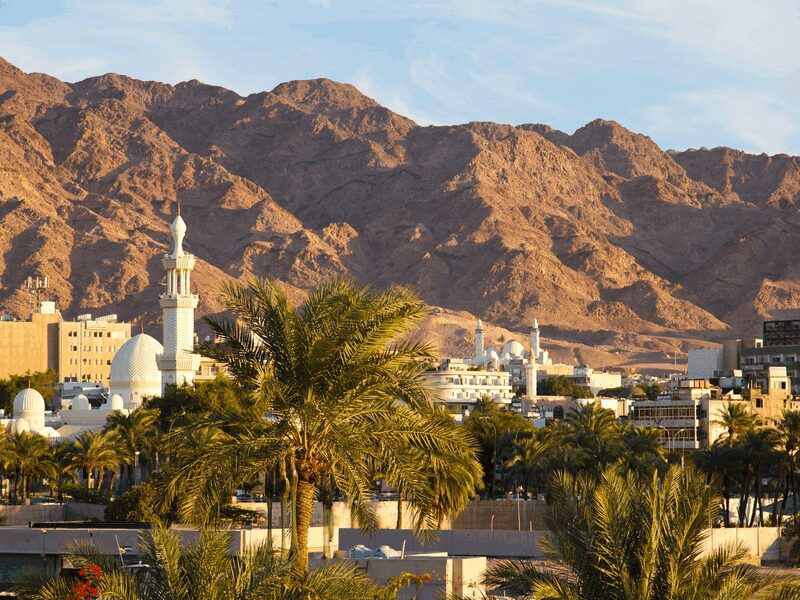
Aqaba’s enchantment extends beneath the waves to the vibrant coral reefs of the Red Sea. These underwater ecosystems are a kaleidoscope of biodiversity, teeming with marine life and bursting with color, offering a mesmerizing spectacle for divers and snorkelers alike.
Surrounding Aqaba, the stark majesty of the Wadi Rum also known as the Valley of the Moon, presents an otherworldly landscape. Monumental rock formations rise from the desert sands, sculpted by millennia of wind and water erosion, creating a silent, timeless tableau reminiscent of a martian terrain.
Above water, Aqaba’s year-round sunshine bathes its pristine beaches in a warm glow, inviting relaxation and tranquility. The seamless integration of natural beauty and recreational leisure is emblematic of the city’s charmed geographical setting.
Coral Reefs Explored
The Red Sea’s coral enclaves near Aqaba are marvels of the underwater world, comprised of over 500 species of fish and a vast array of corals. These silent sentinels of the sea not only provide a critical habitat for marine life but also act as natural barriers that protect Aqaba’s shoreline from erosion and storms.
Diving in Aqaba reveals a submerged wonderland, where the vibrancy of life meets the serenity of the deep. Interactions with graceful sea turtles or sightings of the elusive dugong become cherished memories for the intrepid explorer.
Within these underwater paradises, the intricacy of coral formations is on full display, showcasing the artistry of nature’s own architecture. Delicate table corals and staghorn branches host a bustling community of colorful reef fish, while soft corals sway gently in the ebbing currents.
Each dive site along Aqaba’s coastline tells its own unique story. The Cedar Pride wreck, an artificial reef, has become a living sculpture teeming with life, while the Japanese Gardens boast lush coral beds sprouting from the seafloor like an aquatic Eden.
Preservation efforts are central to maintaining the integrity of these aquatic vistas, involving scientists and conservationists in robust monitoring of coral health and reef resilience. This vigilance ensures that Aqaba’s coral reefs continue to thrive and enchant visitors for generations to come.
Indeed, the value of these underwater ecosystems extends beyond their ecological importance. They are economic assets that fuel tourism and spawning grounds that ensure sustainable fisheries. In essence, Aqaba’s coral reefs are both a natural treasury and a critical resource worthy of our highest conservation efforts.
Dramatic Desert Landscapes
Aqaba is enveloped by timeless desert beauty.
The surrounding region is characterized by its stark, vast deserts. These arid expanses unfold like an artist’s canvas, gradients of golden sands interspersed with rugged mountain ranges, reminiscent of a raw and unrefined masterpiece. Indeed, it is this very landscape that provides the backdrop to numerous historical narratives and continues to enchant visitors with its stark, mesmerizing beauty.
Beyond them lie ancient valleys carved by time.
The allure of these deserts lies not just in their silence. To stand amongst these vast, open spaces is to experience a sense of infinite largeness and antiquity, a feeling that has drawn travelers, poets, and adventurers across the centuries. It is an invitation to explore, to wander, to become a tiny part of their expansive narratives.
The deserts challenge the intrepid with their extremes.
Traverse this wilderness and unearth hidden gems of nature and history alike. The desert of Aqaba is not merely a barren wasteland—it’s a sanctuary of peace, a testament to survival, and a place where life endures against the odds. With the right guidance, these areas reveal their secrets, from ancient petroglyphs to resilient flora and fauna.
From Wadi Rum’s majesty to Aqaba’s coastal grace.
These dramatic desert landscapes form a sharp contrast to Aqaba’s marine biodiversity, yet they completement each other, showing the full spectrum of nature’s grandeur. It is precisely this juxtaposition—the serene waters against the roaring silence of the sands—that defines and references the unique charm of Aqaba, offering insights into a land embracing both sea and desert.
Modern Aqaba Infrastructural Marvel
In a seamless blend of ancient allure and contemporary engineering, Aqaba stands out as a testimony to human tenacity and ingenuity. The city’s infrastructure, a symphony of modernity and strategy, underpins its emergence as a vital economic hub and a paragon of urban planning. With state-of-the-art port facilities and transport networks, Aqaba deftly handles the demands of international trade while preserving its rich cultural tapestry. The development of specialized economic zones further highlights its significance as a pivotal crossroad of commerce and tourism, eloquently narrating a story of transformation from time-honored crossroads to a modern beacon of progress.
Cutting-Edge Port Facilities
Aqaba’s maritime capabilities are truly state-of-the-art.
Strategically positioned as Jordan’s only seaport, Aqaba serves as the maritime gateway for the nation. It boasts advanced port infrastructure designed to accommodate a vast array of shipping needs. With terminals exclusively for cargo like phosphates, a grains silo, and a dedicated tourist marina, its multipurpose facilities confirm its status as a powerhouse in regional maritime logistics. Moreover, Aqaba’s ports are renowned for their incorporation of the latest in navigation and security technologies.
Efficiency and adaptability are at the core of port operations.
The port authority enforces rigorous security measures – ensuring optimal protection for all vessels. With systems that align with international security protocols, the port authority maintains a perimeter of safety around maritime activities. This ensures seamless and secure trade in line with global standards.
Continuous improvements keep Aqaba at the competitive edge.
Recent investments have funneled into enhancing container capacity, modernizing handling equipment, and implementing sophisticated logistic management systems, with the goal of expanding by 2023. These efforts underscore a commitment to fostering trade efficiency and heightening Jordan’s economic connectivity, paving the way for increased regional trade volumes and refined operational excellence within the maritime sector.
Urban Development Successes
Aqaba has undergone transformative urban development, becoming a beacon of progress in the region.
- Strategic Location Maximization: Capitalizing on its prime geographical position, Aqaba has effectively utilized its proximity to major trade routes to bolster economic activity.
- Aqaba Special Economic Zone: The establishment of ASEZ has been pivotal in attracting foreign investment and diversifying the local economy through strategic incentives.
- Infrastructure Modernization: A robust framework of modern infrastructure, from transport networks to technological advancements, has been instrumental in driving urban growth.
- Tourism and Cultural Enrichment: Significant efforts in promoting tourism and cultural heritage have led to an enhanced global profile for the city.
- Sustainable Practices: Incorporation of green initiatives in urban planning signifies Aqaba’s commitment to sustainable and responsible development.
The city’s ports embody a blend of advanced technology and operational efficiency.
Smart city initiatives and eco-friendly approaches demonstrate Aqaba’s dedication to evolving without compromising environmental integrity.
Aqaba Cultural Mosaic
Aqaba’s historical significance as a crossroads of ancient trade has culminated in a rich tapestry of cultural influences, from indigenous Bedouin heritage to Arabian customs, all harmoniously intertwined. This dynamic convergence of traditions has birthed a unique cultural identity that is distinctly Aqaban, mirroring the diversity of the Red Sea’s vibrant coral reefs that lie just beyond the city’s shores.
The city’s bustling souks and aromatic kitchens stand as testament to the myriad of civilizations that have left their mark on Aqaba. The generosity and warmth of its people reflect the historical amalgamation of cultures, offering a hospitable gateway to the splendors of Jordan’s history and the regional influences that continue to shape its present.
Local Festivities Showcased
Aqaba comes alive with color and song during the annual Aqaba Traditional Arts Festival, illuminating the city’s rich cultural tapestry. Here, local artisans share their craft, from intricate tapestries to delicate glasswork, against a backdrop of vibrant performances and regional cuisine.
Celebrations such as Eid al-Fitr inject the city with joyous revelry, following the solemn month of Ramadan.
Arabian horse shows, a cornerstone of Jordanian culture, enchant spectators with displays of equine grace and the skill of their riders. These events are a testament to Aqaba’s reverence for its equestrian heritage and the broader panorama of traditions that have shaped its identity over centuries.
A pinnacle of regional expression is the Aqaba Carnival, which brings together a symphony of music, dance, and culinary delights. It serves as a cultural nexus, encapsulating Aqaba’s dedication to preserving and showcasing its myriad of cultural influences. At once both a feast for the senses and a learning experience, the carnival provides a platform for intercultural exchange, bolstering understanding and enjoyment of a region rich in history and diversity.
Culinary Journey Through Aqaba
The gastronomic landscape of Aqaba is a vivid palate, filled with flavors, textures, and aromas that transcend mere sustenance, bending towards a multisensory adventure. Amidst bustling souks and quiet alleys, a tapestry of culinary traditions is woven from the region’s history and its confluence of civilizations.
Local markets brim with spices and seasonal produce, forming the basis of Aqaba’s cuisine. Fresh seafood is a staple, a testament to the city’s coastal heritage and Red Sea bounty.
In traditional eateries, one can expect to encounter mansaf (Jordan’s national dish of lamb with yogurt sauce), symbolizing the generosity of Arab hospitality and the intrinsic connection between food and culture.
Venture into the heart of Aqaba to explore dining establishments where timeless recipes are passed down through generations. Here, the interplay of spices like cardamom, cumin, and sumac results in dishes that narrate the city’s storied past and its enduring vibrancy.
Ultimately, to dine in Aqaba is to partake in the city’s soul. Experiencing local gastronomy allows one to savor the essence of Aqaba’s identity, etched deeply in every herb-infused, charcoal-grilled, and lovingly-prepared dish.

